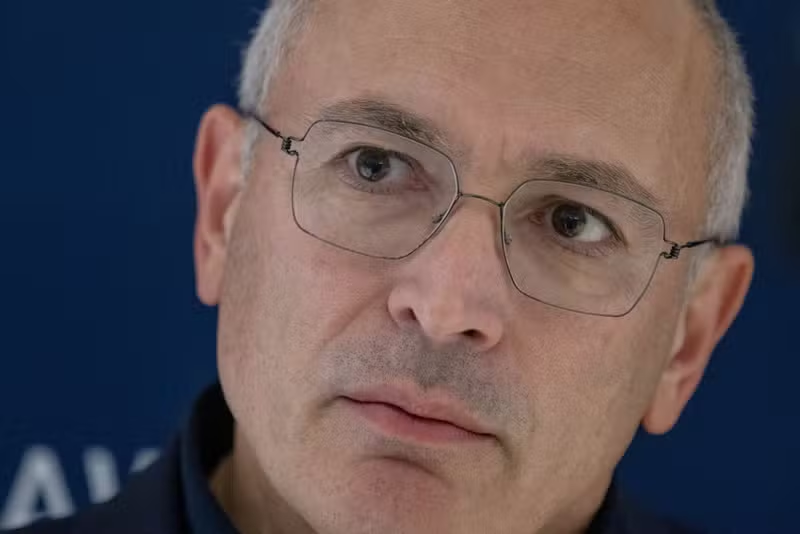Russian opposition in exile skeptical over Trump-Putin negotiations
A few dozen Kremlin opponents attended an Anti-war conference organised in Brussels at the initiative of Mikhail Khodorkovsky, who has become one of the main figures of Russian dissent abroad.

Donald Trump’s diplomacy has disrupted certainty, even within the Russian opposition in exile. Two days after his telephone conversation with Vladimir Putin, the actions of the American president and the reactions from the Kremlin leader fueled discussions on Wednesday, May 21, in Brussels, where an Anti-war conference gathered several dozen Russian opponents. The event was organised at the initiative of Mikhail Khodorkovsky, who has become one of the leading figures of Russian dissent abroad. “In fact, Trump has made a very good offer to Putin. It is wrong to say that Moscow is not tempted to use it to end the war,” said the former head of the oil group Yukos, who, after being convicted in Russia in a politically charged trial, was released on December 20, 2013, after 10 years in prison.
Now a refugee in London, Khodorkovsky did not come to Brussels to talk about his past, but about Russia’s future. He is convinced that Putin’s regime will eventually fall. Since the invasion of Ukraine on February 24, 2022, the war has, in his view, only prolonged its survival. “I am optimistic. With Trump, there is hope for peace,” he told Le Monde on the sidelines of the conference. “Putin has obtained from Washington a guarantee to keep almost everything he has conquered [Crimea and the four regions of the Donbas]. And some sanctions imposed on Russia would be lifted. So it is a good opportunity to seize. Either Putin accepts it, or he tries to push further into Ukraine toward the Dnipro with a new offensive this summer. But, in the long run, he risks encountering Ukrainian resistance strengthened by increased European military aid,” Khodorkovsky warned. He believes Europe has made the right choice: “Answer tanks with tanks. But the logic of escalation will not go as far as all-out war because nobody wants a nuclear conflict”.
In the ranks of the opposition in exile, however, many believe that Mr Trump has already given in too much and negotiated too conciliatorily. “You can get a lot more with both a kind word and a gun in your hand than with just a kind word,” quipped those close to Mr Khodorkovsky. “These negotiations are turning heads. As expected, they have reached an impasse. This war is about one man, Putin. We need more economic sanctions and military pressure against him”, says Marina Ovsiannikova, one of the anonymous people made famous by their opposition to the war. On 14 March 2022, less than a month after the invasion of Ukraine, this producer for the Kremlin’s main TV channel held up a sign reading ‘No to war’ in the middle of the news. Now living in exile in France, she attended the Anti-war conference in Brussels and is now calling for a firmer stance against the Kremlin.
“Europe must show that it is resisting”.
“This is the only language that Mr Putin understands. Mr Trump speaks too softly. The Kremlin will think that this is normal and that it can carry on. Europe, on the other hand, needs to show that it can stand up and respond”, similarly insists Kirill Parubets, one of the shadowy opponents gathered in Belgium. A Russian committed to the Ukrainians, he fled Moscow in 2024 after being hunted down by the FSB (the Russian Federal Security Service). Now living in France, he works for an association that identifies and helps Ukrainian soldiers detained in Russia.
At the meeting in Brussels, a dozen organisations came to seek European funding, following the US decision to cut aid to international NGOs. “Mr Trump is sticking to his logic as a businessman. He only thinks about what peace will bring to the United States. These negotiations would be useful if they led to a ceasefire. But at the moment, they are only being used to showcase the Putin-Trump friendship”, laments Oleskii Ladukhine, another Russian-Ukrainian, in the corridors of the conference. His organisation is seeking to mobilise international opinion on “the thousands of civilians kidnapped in the occupied territories and detained in Russia in violation of international conventions on prisoners”. Their fate is not on the agenda for discussions between Washington and Moscow. “It’s not Trump’s priority. And Putin is keeping them as bargaining chips for future negotiations”, fears Mr Ladukhine.
Others in Brussels prefer to speak anonymously. To protect their colleagues still in Russia, they do not want to be identified. “At first, these negotiations gave us hope, but now they are depressing us. Putin has been strengthened by them”, laments one of them. “These negotiations are hurting Ukraine and Russia. By giving in to Putin, we are giving him carte blanche to continue the war and to step up the repression in Russia”, fears another, angry at the Westerners who are ready to “normalise” relations with this regime. “I have more hope in European sanctions than in Trump’s statements. I want to believe that the law and international institutions will prevail in the end”, hopes Elina Novopashennaia, a young opponent. From her exile in Berlin, she founded an organisation that helps political prisoners in Russia to receive distance learning behind bars. “He who opens a school door, closes a prison”, she concludes, quoting Victor Hugo – in Russian – to give herself hope in a context full of uncertainty.
The article by Benjamin Quénelle (Brussels, Belgium, special correspondent) was originally published in Le Monde



